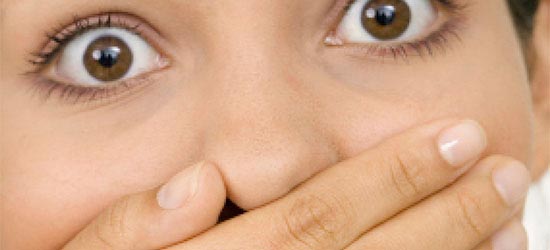Most, if not all, of us have been there, that socially awkward moment when you’re assaulted by somebody’s less than sweet-smelling breath. Not exactly the most desirable position to be in. And it makes the situation even worse when subtle attempts to diffuse the problem (like handing the person a mint, for example) are declined, as the person seems oblivious to his or her big problem.
We might be tempted to ridicule these persons, or may want to address the situation, but really, how do you diplomatically tell someone that his or her breath smells… bad? It is also important to remember that, although poor oral or dental hygiene is a main cause of halitosis (which is the clinical name for foul-smelling breath), this isn’t always the case.
There are a number of underlying conditions that may contribute to this socially intolerable condition. Dr. Tiffany Francis of All Smiles Dental Care in Kingston helped us get to the root of the issue. According to Dr. Francis, “This odour can strike at certain times or be persistent, depending on the cause. In many persons, the bacteria that live in the mouth (particularly on the back of the tongue) are the primary causes of bad breath.” We all know that those movies that show people greeting their significant other with a kiss first thing in the morning could not be further from the truth. Nobody wants to be kissed with ‘morning breath’. Dr Francis lets us know that, “The “morning mouth” type of bad breath occurs because the saliva that regularly washes away decaying food and odours during the daytime diminishes at night while you are sleeping.”
This is one of those instances where bad breath is considered normal. This along with ‘hungry breath’, though
unpleasant, can be easily remedied, and is not a health concern. Of course, we can even invite bad breath by eating certain things such as garlic and onion, which have a very pungent smell, as well as by engaging in the practice of smoking cigarettes or chewing tobacco.
There are however, some other issues that cause halitosis and require immediate attention. Dr. Francis says infections in the mouth, such as periodontal (gum) disease and tooth decay (cavities), and respiratory tract infections, such as throat infections, sinus infections and lung infections are other causes of halitosis. In
addition, dry mouth has been identified as another cause.
Dry mouth is a result of salivary gland problems, medications, or “mouth breathing”. Furthermore, and more
seriously, systemic illnesses, such as diabetes, liver disease, kidney disease, lung disease, sinus disease and reflux disease are also contributors to the dreaded halitosis.
We also got the view of Dr Min Htut of the Edgeport Medical and Dental Centre, St. Catherine, Jamaica. Dr. Htut pointed out the culprit of plaque buildup in contributing to halitosis.


Share this post:
Most, if not all, of us have been there, that socially awkward moment when you’re assaulted by somebody’s less than sweet-smelling breath. Not exactly the most desirable position to be in. And it makes the situation even worse when subtle attempts to diffuse the problem (like handing the person a mint, for example) are declined, as the person seems oblivious to his or her big problem.
We might be tempted to ridicule these persons, or may want to address the situation, but really, how do you diplomatically tell someone that his or her breath smells… bad? It is also important to remember that, although poor oral or dental hygiene is a main cause of halitosis (which is the clinical name for foul-smelling breath), this isn’t always the case.
There are a number of underlying conditions that may contribute to this socially intolerable condition. Dr. Tiffany Francis of All Smiles Dental Care in Kingston helped us get to the root of the issue. According to Dr. Francis, “This odour can strike at certain times or be persistent, depending on the cause. In many persons, the bacteria that live in the mouth (particularly on the back of the tongue) are the primary causes of bad breath.” We all know that those movies that show people greeting their significant other with a kiss first thing in the morning could not be further from the truth. Nobody wants to be kissed with ‘morning breath’. Dr Francis lets us know that, “The “morning mouth” type of bad breath occurs because the saliva that regularly washes away decaying food and odours during the daytime diminishes at night while you are sleeping.”
This is one of those instances where bad breath is considered normal. This along with ‘hungry breath’, though
unpleasant, can be easily remedied, and is not a health concern. Of course, we can even invite bad breath by eating certain things such as garlic and onion, which have a very pungent smell, as well as by engaging in the practice of smoking cigarettes or chewing tobacco.
There are however, some other issues that cause halitosis and require immediate attention. Dr. Francis says infections in the mouth, such as periodontal (gum) disease and tooth decay (cavities), and respiratory tract infections, such as throat infections, sinus infections and lung infections are other causes of halitosis. In
addition, dry mouth has been identified as another cause.
Dry mouth is a result of salivary gland problems, medications, or “mouth breathing”. Furthermore, and more
seriously, systemic illnesses, such as diabetes, liver disease, kidney disease, lung disease, sinus disease and reflux disease are also contributors to the dreaded halitosis.
We also got the view of Dr Min Htut of the Edgeport Medical and Dental Centre, St. Catherine, Jamaica. Dr. Htut pointed out the culprit of plaque buildup in contributing to halitosis.
Share this post: